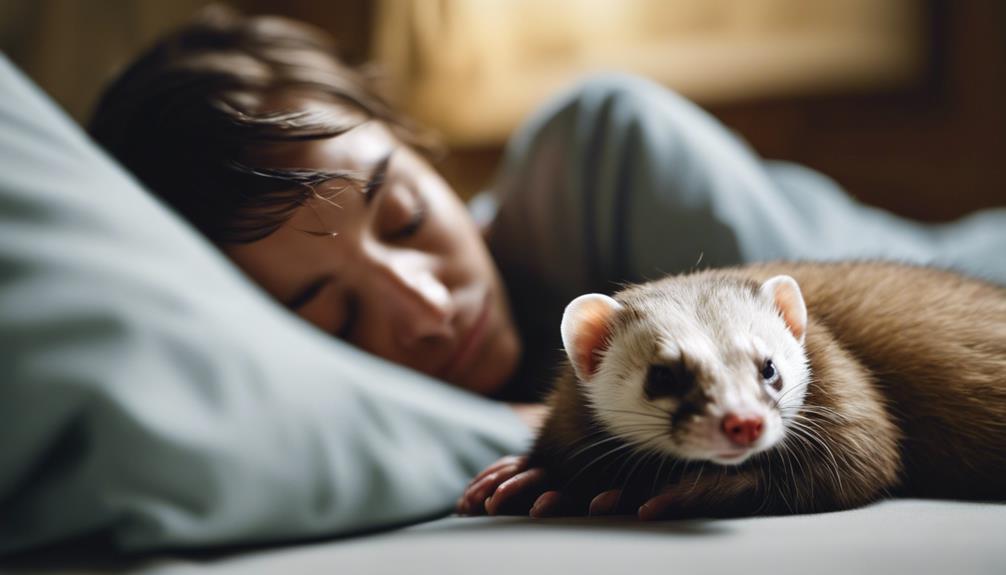What are Ferret Sleep Patterns: Why It’s Important to Understand

Ferrets are crepuscular animals, meaning they are most active during dawn and dusk. They typically sleep for 14-18 hours a day, broken up into short periods throughout the day and night.
Their sleep patterns are crucial for their well-being as it allows them to conserve energy for their bursts of activity when they are awake. Ferrets are obligate carnivores, and in the wild, they would spend much of their time hunting for food, which requires bursts of energy.
It’s important for ferret owners to understand and respect their pets’ sleep patterns by providing a quiet, dimly lit environment during their rest periods. This ensures that they get the rest they need to stay healthy and happy.
Understanding the Crepuscular Nature of Ferrets
Unlocking the Mystery of Ferrets’ Twilight Adventures
Have you ever wondered why ferrets are most active during the magical hours of dawn and dusk? Let’s dive into the fascinating world of these crepuscular creatures to uncover the secrets behind their behavior!
What makes ferrets crepuscular?
- Ferrets, like many small mammals, are wired to love the in-between times of day – dawn and dusk.
- Their internal clocks, known as circadian rhythms, dictate when they’re most awake and lively.
- Unlike popular belief, ferrets aren’t night owls; they’re more like twilight enthusiasts!
Why do ferrets prefer dawn and dusk?
- Evolution has equipped ferrets with a smart survival strategy.
- By being active during twilight, ferrets dodge daytime predators and seize hunting opportunities at the break of day and night.
How does this knowledge help ferret owners?
- Understanding your ferret’s crepuscular nature is key to providing them with the best care.
- Tailoring their routine to match their natural rhythm ensures a happy and healthy life for your furry friend.
Next time you see your ferret frolicking at dawn or dusk, remember – they’re not just night creatures; they’re twilight adventurers!
Impact of Sleep Patterns on Ferret Health

Are you curious about how sleep affects your furry ferret friend’s health? Let’s dive into the fascinating world of ferret sleep patterns and their impact on well-being:
- Sweet Dreams, Happy Ferret: Just like us, ferrets love a cozy and quiet place to catch some Z’s. Providing them with a comfy sleeping spot can help them get the rest they need.
- Spotting Sleep Signals: Keeping an eye on your ferret’s sleep habits can clue you in on any potential health issues. Changes in their snooze routine might be a sign that something’s up.
- Snooze Cycle Secrets: Ferrets have a unique sleep cycle, moving between deep slumber and wakefulness. Disruptions to this cycle can stress out your ferret and impact their overall health.
- Timing is Everything: Knowing when your ferret naturally likes to sleep can help you create a routine that suits their body clock. Consistency in their sleep schedule can lead to a healthier, happier ferret.
Creating a Suitable Sleep Environment

How can you make sure your ferret gets the best sleep possible? Let’s dive into creating the perfect sleep environment for your furry friend!
Do you know what ferrets love to snuggle in for a good night’s sleep? Soft bedding like fleece blankets and hammocks! These cozy materials give them a comfy and secure place to rest.
Want to make sure your ferret sleeps without any disruptions? Keep their sleeping area quiet and free from loud noises. They need peace and quiet to snooze soundly.
What’s the right temperature for your ferret’s sleep space? Aim for a cozy 60-75°F (15-24°C) to keep them comfy all night long. Ferrets like it not too hot, not too cold.
Did you know that ferrets prefer a dimly lit environment for sleeping? Lower the lights or cover their cage to create a dark and calming atmosphere, just like nighttime.
Recognizing Signs of Sleep Disturbances

How Can You Tell If Your Ferret Has Sleep Troubles?
Do you ever wonder if your furry friend is getting a good night’s sleep? Ferrets have interesting sleep habits, so it’s essential to know what to look for to spot any sleep disturbances. Let’s dive into signs that may indicate your ferret isn’t getting the rest they need:
- Restless Behavior: Normally, ferrets are active during their awake time. If you notice your ferret moving around a lot during sleep, it could mean something’s up.
- Frequent Waking: Does your ferret wake up often during naps or struggle to fall back asleep? These could be signs that their sleep is being disrupted.
- Strange Sounds: If your ferret makes unusual noises like whimpering or excessive chirping while sleeping, it might signal discomfort or sleep issues.
- Changing Positions: Keep an eye out for sudden changes in how your ferret is sleeping or if they seem unable to get comfy. These changes could hint at sleep problems.
Importance of a Consistent Sleep Routine

Maintaining a consistent sleep routine is crucial for ferrets, as it directly impacts their sleep quality and overall health. Disrupted sleep patterns can lead to various health issues such as decreased immune function and heightened stress levels.
Therefore, establishing a regular sleep schedule is essential in ensuring the well-being and vitality of pet ferrets.
Sleep Quality Benefits
Discover the Magic of Consistent Sleep Routines!
Hey there, sleep champs! Did you know that sticking to a regular sleep schedule can do wonders for how you feel? Let’s dive into how a consistent sleep routine can boost your mood and overall well-being:
Emotional Benefits of a Good Night’s Sleep:
- Happy Vibes: How cool is it that a regular sleep pattern can help you feel less grumpy and more chill?
- Brain Power: Imagine your brain as a superhero getting stronger with each night of good sleep—better focus, memory, and smart decision-making!
- Chill Pill for Stress: Wanna lower your stress levels? Well, guess what? Following a consistent sleep routine is like a magic potion for relaxation and mental peace.
- Power Up: Get ready to rock your day! Quality sleep boosts your energy levels, making you feel pumped up to tackle anything that comes your way.
By understanding these awesome benefits, you’ll see why it’s super important to make sleep a priority in your daily routine.
Health Impacts of Disrupted Sleep
The Importance of Good Sleep for Your Health
Hey there, did you know that getting a good night’s sleep is super important for your health? Let’s dive into why having a regular sleep routine is crucial for your well-being!
Why Is Sleep Important?
- Brainpower Boost: Did you know that lack of sleep can make it harder for you to think clearly and concentrate in school?
- Stay Healthy: Getting enough sleep helps your immune system stay strong, so you can fight off germs and stay healthy.
- Avoiding Sickness: Not getting enough sleep can make you more likely to get sick or develop serious health problems like heart disease or diabetes.
- Body Repair: When you sleep, your body gets a chance to repair tissues and grow, helping you stay strong and healthy.
Tips for Better Sleep
- Consistent Schedule: Try to go to bed and wake up at the same time every day to help regulate your body’s internal clock.
- Relaxing Routine: Create a calming bedtime routine, like reading a book or taking a warm bath, to help you wind down and get ready for sleep.
- Comfortable Environment: Make sure your bedroom is quiet, dark, and at a comfortable temperature to create the perfect sleep environment.
- Limit Screen Time: Avoid screens like phones, tablets, and TVs before bed, as the blue light can make it harder to fall asleep.

Unlocking the Secrets of Ferret Bonding Through Shared Sleep Patterns
Have you ever wondered how ferrets build strong connections through synchronized sleep? Let’s delve into the fascinating world of ferret social dynamics and communication!
Here are four key emotional aspects of bonding through shared sleep patterns:
- Connection: When ferrets snuggle up in their cozy slumber, it’s a heartwarming display of their deep emotional bond, showing how companionship is vital in their lives.
- Security: Watching ferrets huddle together while sleeping reveals the sense of safety they find in each other’s company, creating a comforting and secure environment.
- Affection: The sweet moments of grooming and cuddling during shared naps highlight the loving nature of ferrets, strengthening their social connections and emotional closeness.
- Contentment: The serene and happy expressions on their faces as they nap together reflect the joy and satisfaction they feel from each other’s presence, promoting overall well-being and happiness within the group.
Adjusting Your Schedule for Your Ferret

Are you wondering how to make your furry ferret friend happier and more energetic? Well, it’s all about syncing up your daily routine with their natural sleep-wake cycle! Ferrets are most active during the early morning and evening, so adjusting your schedule can make a big difference in their well-being. Let’s dive into how you can align your activities to match your ferret’s peak times:
- Morning Magic: Start your day by spending quality time bonding with your ferret. Play, feed, and exercise together to kickstart a great day for both of you.
- Evening Excitement: As the day winds down, make sure to set aside time for more bonding, play, feeding, and exercise with your ferret. It’s a perfect way to wrap up the day on a positive note.
By following this routine and syncing up with your ferret’s natural rhythm, you’ll not only meet their needs but also strengthen your bond with your adorable pet. It’s a win-win situation for both of you, creating a happy and harmonious living environment.
Frequently Asked Questions
Can Ferrets Experience Sleep Disorders or Insomnia?
Ferrets, like humans, can experience sleep disorders or insomnia due to genetic predisposition or environmental factors. Treatment options may include behavioral changes, creating a sleep-conducive environment, or consulting a veterinarian for further evaluation and management.
What Factors Can Disrupt a Ferret’s Sleep Patterns?
Light exposure, stress, diet, and noise can disrupt a ferret’s sleep patterns. Excessive light exposure or noise, stressful environments, and inappropriate diet can lead to sleep disturbances in ferrets, impacting their overall health and well-being.
How Long Do Ferrets Typically Sleep in a 24-Hour Period?
Ferrets typically sleep for 14-18 hours in a 24-hour period, divided into short cycles. The duration and quality of their sleep are influenced by factors like their sleep environment, stress levels, and overall health.
Can Ferrets Have Nightmares or Other Sleep Disturbances?
Ferrets, like humans, can experience dreaming patterns and nighttime disturbances. These small creatures might twitch, vocalize, or exhibit restless behavior during sleep. Understanding their sleep patterns and potential disturbances can help in ensuring their overall well-being.
Are There Any Specific Sleep-Related Behaviors That Indicate a Health Issue in Ferrets?
Unusual sleep patterns in ferrets like sleep apnea, stress-related behaviors, or excessive sleeping can indicate underlying health issues. Respiratory problems, pain, or changes in sleep duration may signal a need for veterinary evaluation.











